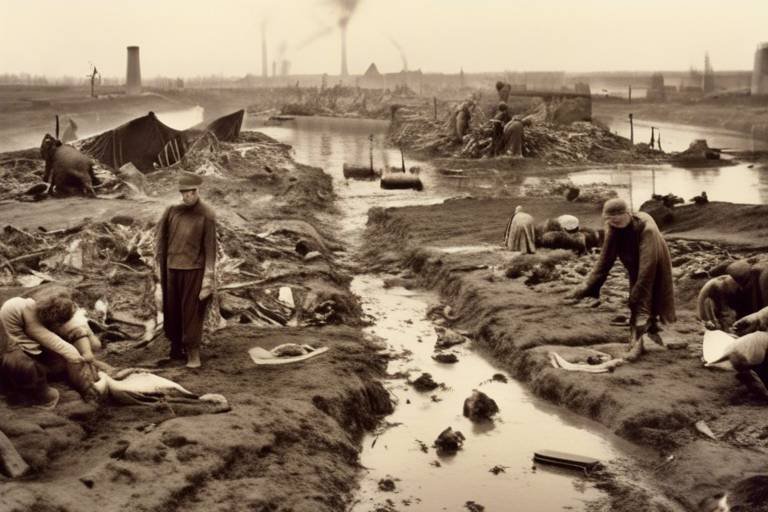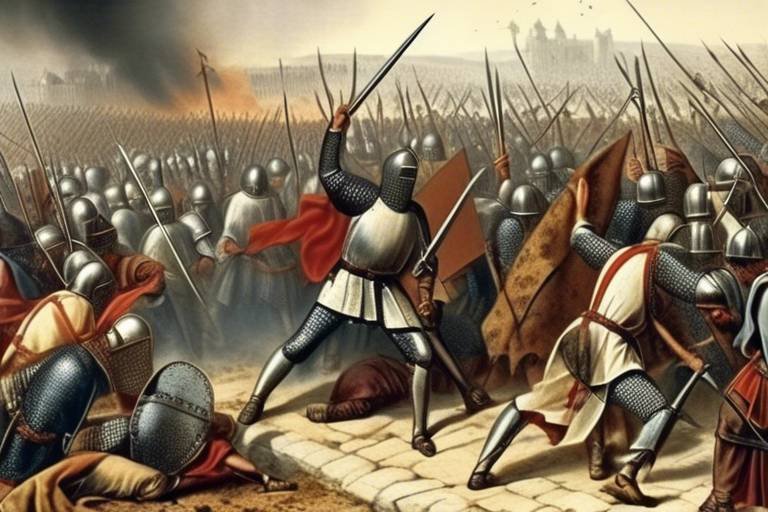The Role of Women in the Enlightenment - Key Figures
During the Enlightenment period, a time marked by intellectual and cultural advancements, women played a crucial role in challenging societal norms and contributing to various fields of knowledge. Despite the predominance of male thinkers during this era, several key female figures emerged, leaving a lasting impact on history through their pioneering ideas and achievements.
Mary Wollstonecraft stands out as a prominent figure in the Enlightenment, known for her groundbreaking feminist writings that advocated for women's rights and education. By challenging traditional gender roles and emphasizing the importance of equality, Wollstonecraft paved the way for future generations of women to strive for independence and empowerment.
Émilie du Châtelet, a brilliant mathematician, physicist, and philosopher, defied gender-based obstacles to make significant contributions to the fields of science and philosophy. Her work not only expanded the boundaries of knowledge but also served as an inspiration for women pursuing careers in male-dominated disciplines.
Olympe de Gouges, a French playwright and political activist, used her platform to advocate for gender equality, the abolition of slavery, and social justice. Through her revolutionary writings, de Gouges challenged the status quo and called for a more inclusive and egalitarian society during the Enlightenment era.
Laura Bassi, the first female physics professor in Europe, broke barriers in academia and made notable contributions to the scientific community. Her achievements as a physicist and professor highlighted the importance of gender diversity in intellectual pursuits and paved the way for future generations of female scientists.
Madame de Stael, a prominent French writer and thinker, influenced public opinion through her literary works and political commentary. By challenging conventional norms and promoting intellectual discourse, de Stael played a significant role in shaping the cultural landscape of the Enlightenment period.
Julie de Lespinasse, known for hosting intellectual gatherings and salons, facilitated discussions on literature, philosophy, and politics. Her salon culture provided a space for intellectual exchange and debate, fostering a sense of community among Enlightenment thinkers and challenging traditional modes of intellectual engagement.
Anna Maria van Schurman, a Dutch scholar and artist, excelled in various fields of study, including philosophy, theology, and linguistics. Her diverse accomplishments showcased the intellectual capabilities of women and contributed to the rich tapestry of knowledge during the Enlightenment.
Caroline Herschel, a pioneering female astronomer, made significant astronomical discoveries despite facing gender discrimination in the scientific community. Her contributions to the field of astronomy, including the discovery of comets and nebulae, highlighted the importance of inclusivity and diversity in scientific inquiry.

Mary Wollstonecraft
Mary Wollstonecraft, a trailblazing figure in the Enlightenment period, was a staunch advocate for women's rights and equality. Her groundbreaking feminist ideas challenged the prevailing gender norms of her time, paving the way for future generations of women to strive for independence and intellectual freedom. Wollstonecraft's influential writings, most notably "A Vindication of the Rights of Woman," emphasized the importance of education for women and argued against the societal constraints that limited their potential.
Despite facing criticism and backlash for her progressive views, Mary Wollstonecraft remained steadfast in her beliefs, advocating for women's access to education and opportunities equal to those of men. By promoting the idea that women were capable of rationality and intellectual pursuits, she sparked a revolution in feminist thought that continues to resonate today.
Wollstonecraft's legacy extends beyond her advocacy for women's rights; she also delved into political philosophy, exploring concepts of freedom, equality, and social justice. Her works not only challenged the status quo but also laid the foundation for future movements seeking to dismantle oppressive systems and promote equality for all individuals.

Émilie du Châtelet
Émilie du Châtelet, a remarkable figure of the Enlightenment period, was a woman ahead of her time. Despite the societal constraints placed on women during that era, she managed to carve out a place for herself in the male-dominated fields of mathematics, physics, and philosophy. Born in Paris in 1706, Émilie was not only a brilliant mathematician but also a gifted physicist and philosopher.
Her most notable contribution was her French translation and commentary on Isaac Newton's Principia, which played a crucial role in popularizing Newtonian physics in France. This monumental work not only showcased her intellectual prowess but also demonstrated her dedication to advancing scientific knowledge.
Émilie du Châtelet's passion for learning and exploration knew no bounds. Despite facing numerous obstacles due to her gender, she pursued her studies relentlessly, delving into complex mathematical and scientific concepts with fervor and determination. Her work laid the foundation for future generations of female scientists and thinkers, inspiring them to break free from the constraints of societal expectations.
Through her writings and scholarly pursuits, Émilie challenged the prevailing notions of gender roles and intellectual capabilities. She proved that women were equally capable of engaging in rigorous academic pursuits and making significant contributions to the fields of science and philosophy.
Émilie du Châtelet's legacy continues to inspire and empower women in the modern era, serving as a testament to the enduring impact of her groundbreaking work. Her dedication to knowledge, her fearless pursuit of intellectual excellence, and her unwavering belief in the power of education have left an indelible mark on the history of the Enlightenment and the advancement of women in academia.

Olympe de Gouges
Olympe de Gouges was a remarkable figure during the Enlightenment era, known for her groundbreaking writings and activism that challenged societal norms and advocated for equality and justice. Born as Marie Gouze in 1748, she adopted the pen name Olympe de Gouges to conceal her identity as a female writer in a male-dominated society.
One of her most famous works, "Declaration of the Rights of Woman and the Female Citizen" (1791), paralleled the Declaration of the Rights of Man and of the Citizen, demanding equal rights for women. This bold declaration was a significant step towards gender equality and laid the foundation for feminist movements in the centuries to come.
Aside from her feminist advocacy, Olympe de Gouges was an outspoken critic of slavery, calling for its abolition in French colonies. Her play "Slavery and the Slave Trade" (1789) condemned the inhumane treatment of enslaved individuals and urged for their liberation, demonstrating her commitment to social justice and human rights.
Despite her progressive ideas and courageous stance on controversial issues, Olympe de Gouges faced backlash and criticism from conservative factions. Her unwavering dedication to challenging the status quo and speaking out against injustice ultimately led to her arrest and execution during the Reign of Terror in 1793.
Through her writings and activism, Olympe de Gouges left a lasting legacy that continues to inspire advocates for gender equality, human rights, and social reform. Her fearless pursuit of justice and equality serves as a testament to the power of individual voices in sparking societal change and shaping the course of history.

Laura Bassi
Laura Bassi, an Italian physicist and professor, was a trailblazer in the male-dominated academic world of the Enlightenment era. Born in Bologna in 1711, Bassi defied societal expectations by pursuing a career in science, eventually becoming the first female physics professor in Europe. Her passion for knowledge and relentless dedication to her studies led her to make significant contributions to the scientific community, particularly in the fields of physics and mathematics.
Despite facing numerous challenges and prejudices due to her gender, Bassi's intellect and perseverance shone through, earning her recognition and respect among her male colleagues. Her groundbreaking research on electricity and Newtonian physics paved the way for future generations of female scientists, inspiring them to pursue their academic ambitions without fear of societal constraints.
Bassi's remarkable achievements extended beyond her academic pursuits. She was not only a respected scholar but also a devoted wife and mother, balancing her scientific career with her family responsibilities. Her ability to excel in multiple roles exemplified her strength and determination, serving as a role model for women striving to break barriers and make their mark in male-dominated fields.
Throughout her career, Bassi's passion for education and knowledge dissemination was evident in her commitment to teaching and mentoring students. Her influential lectures and academic guidance inspired a new generation of scholars, fostering a culture of intellectual curiosity and academic excellence.
As a pioneer in the field of physics and a champion for gender equality in academia, Laura Bassi's legacy continues to resonate today, reminding us of the power of perseverance, intellect, and determination in overcoming societal barriers and achieving greatness.

Madame de Stael
Madame de Stael, a prominent French writer and thinker, left a lasting intellectual legacy during the Enlightenment period. Known for her literary works and political commentary, she played a significant role in challenging conventional norms and influencing public opinion. Through her writings, Madame de Stael addressed key societal issues and advocated for social change, sparking discussions on topics ranging from politics to culture.
Her salons became renowned for fostering intellectual exchange and debate among prominent figures of the time. Madame de Stael's gatherings provided a platform for discussions on literature, philosophy, and politics, shaping the intellectual landscape of the era. By encouraging open dialogue and sharing diverse perspectives, she contributed to the dissemination of new ideas and the promotion of critical thinking.
Madame de Stael's influence extended beyond her literary pursuits, as she actively engaged in political discourse and social commentary. Her bold opinions and fearless advocacy for individual liberties challenged the status quo and inspired others to question authority. Through her writings, she sought to empower individuals to think independently and critically about the world around them.

Julie de Lespinasse
Julie de Lespinasse, a prominent figure in the Enlightenment era, played a pivotal role in fostering intellectual exchange and debate through her renowned salons. Known for her wit, charm, and intellect, Lespinasse hosted gatherings that attracted some of the most brilliant minds of her time. Her salons became a hub for discussions on literature, philosophy, and politics, creating a space where ideas flourished and opinions clashed. Lespinasse's ability to facilitate meaningful conversations and encourage critical thinking left a lasting impact on the intellectual landscape of the Enlightenment.

Anna Maria van Schurman
Anna Maria van Schurman was a remarkable Dutch scholar and artist who left a lasting impact on various fields of study during the Enlightenment period. She excelled in disciplines such as philosophy, theology, and linguistics, showcasing her diverse intellectual capabilities. Despite the societal constraints placed on women during her time, Anna Maria van Schurman broke barriers and made significant contributions to the intellectual landscape of the era.

Caroline Herschel
Caroline Herschel, a pioneering female astronomer, played a crucial role in advancing our understanding of the cosmos during the Enlightenment period. Despite facing significant gender discrimination in the male-dominated field of astronomy, Herschel made remarkable astronomical discoveries that reshaped our knowledge of the universe. Her dedication and perseverance led to groundbreaking achievements, including the discovery of several comets and nebulae.
Caroline Herschel's contributions to astronomy were not only significant in terms of her discoveries but also in challenging the prevailing gender norms of her time. By breaking barriers and excelling in a field traditionally reserved for men, Herschel paved the way for future generations of female scientists to pursue their passion for astronomy and make valuable contributions to the scientific community.
One of Herschel's most notable achievements was the discovery of the comet 35P/Herschel-Rigollet, named in recognition of her groundbreaking work in astronomy. Her meticulous observations and dedication to her craft established her as a respected figure in the scientific community, inspiring others to follow in her footsteps and pursue knowledge beyond the constraints of societal expectations.
Frequently Asked Questions
- Who were some key female figures during the Enlightenment period?
Key female figures during the Enlightenment period included Mary Wollstonecraft, Émilie du Châtelet, Olympe de Gouges, Laura Bassi, Madame de Stael, Julie de Lespinasse, Anna Maria van Schurman, and Caroline Herschel.
- What were the main contributions of Mary Wollstonecraft?
Mary Wollstonecraft was a pioneering feminist who advocated for women's rights, education, and equality. She challenged traditional gender norms through her writings and inspired future generations with her ideas on gender equality.
- How did Émilie du Châtelet overcome gender-based obstacles in her work?
Émilie du Châtelet, a brilliant mathematician, physicist, and philosopher, overcame gender-based obstacles by demonstrating her exceptional intellect and making substantial contributions to the fields of science and philosophy.
- What were some of the revolutionary writings of Olympe de Gouges?
Olympe de Gouges was known for her revolutionary writings advocating for gender equality, abolition of slavery, and social justice. Her activism during the Enlightenment era challenged societal norms and called for reform.
- How did Laura Bassi break barriers in academia?
Laura Bassi became the first female physics professor in Europe, breaking barriers in academia and contributing significantly to the scientific community through her achievements in physics and her role as a professor.
- What was the intellectual legacy of Madame de Stael?
Madame de Stael left an intellectual legacy through her literary works and political commentary that challenged conventional norms and influenced public opinion during the Enlightenment, shaping cultural and intellectual discourse.



















